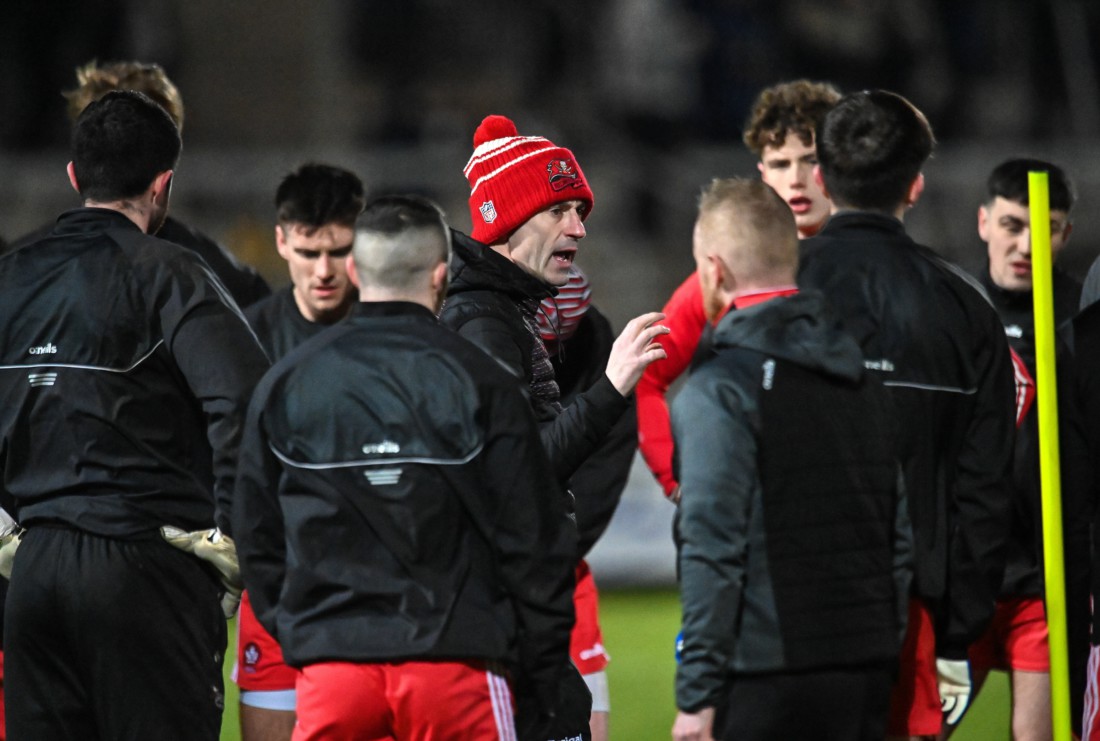WHEN asked by Gaelic Life’s Michael McMullan what he learnt from last year’s National League, Rory Gallagher replied “I learnt that we weren’t prepared enough for it. We weren’t focused well enough and we weren’t hungry enough.” A normal, standard response from a GAA manager – preparation, focus, hunger.
For the first two (preparation and focus), we can assume that there will be certain tangible steps put in place in order to improve. That’s a given in all sports – win or learn. Analyse mistakes, implement something new, execute, upgrade. Nothing major there.
In practice, that might look like something new on certain opposition kick-outs, simple walk-throughs, and what to do on their own kick-outs. Everyone will know their roles, positions, targets – preparation and focus ticked off.
But what of the third, to improve hunger?
You can imagine the scenes; a team stepping onto the pitch, huddled up to receive their training instruction, to be then told by management, “tonight’s session is about improving our hunger – away ye go.”
“Uh oh, we don’t really know what that means. So, we’ll be more aggressive in the tackle, we’ll get into scraps, we’ll knock 40 colours of sh*te out of each other, and we’ll pass it off as improving our hunger.”
And everyone around saying, “God, they were hungry tonight.” Job done, box ticked.
And what you do is you increase the risk of injury, of team grievances, and an atmosphere that generally has no long-term future – and I mean more than a season. Why? Because ‘hunger’ is just a nonsense word, without instructions – like the dreaded “But lads, remember go out and enjoy yourself.” It’s magic, pixie dust, completely unsubstantial, intangible. And ultimately dangerous. If we don’t have clear instructions as to what it is we are to work on, how can we improve?
This interview isn’t an isolated case of cheap vocab. There are hundreds, if not thousands of managers up and down the country, and unfortunately most are in our underage, spewing out sporting jargons.
Why? Because it’s a smoke screen to veil their own blind spots. Under pressure? Let’s claim that our players lack hunger, let’s re-apportion the blame, and let’s wipe our hands clean of any responsibility to learn and improve what’s really missing.
So, what is really going on?
Firstly, let’s replace the word hunger with motivation. At the risk of upsetting Instagram personal trainers, motivation is a real thing. It is the driving force which causes individuals to take action to initiate, continue and terminate behaviours in the pursuit of a goal.
By defining the problem with the correct vocab, we can now look to solve the issue. So, when Gallagher states “we weren’t hungry enough” what he means is we didn’t have the right “motivation” to carry out the desired behaviours that would allow us to achieve our goal.
So, let’s look at motivation in more depth.
It can be subdivided into two forms, intrinsic and extrinsic. Both are necessary, but in terms of long-term sustainability, one is more beneficial than the other.
Intrinsic motivation is often seen as more beneficial as it encourages people to complete tasks because they are personally invested in them. This type of motivation is often based on interests, values, and a sense of self-fulfilment.
Intrinsic motivation can be further divided into four components: enjoyment, personal satisfaction, challenge, and growth. Why do you want to play? For the fun of it, to challenge myself, to see if I can. People who are intrinsically motivated are driven by their own internal rewards and tend to be more persistent in completing tasks even in the face of failure.
Conversely, extrinsic motivation is driven by outside forces, such as money, praise, or fear of punishment. This type of motivation is often seen as less beneficial as it can lead to a decrease in intrinsic motivation. People who are extrinsically motivated may be less likely to continue working on tasks after the external reward or punishment has been given.
Fear of punishment? Less likely to continue working on tasks after external reward has been given? Sound familiar?
I see it in more than 75 per cent of the athletes I work with. And I usually tell them to go out and knock forty colours of sh*te out of their teammates at the next possible training opportunity to improve it.
Or, we enter into a process of working on their intrinsic motivation. Building motivation. Harnessing motivation.
All healthy, all sustainable, all long-term. And all undervalued by management, unwilling to invest in the soft skills.
Receive quality journalism wherever you are, on any device. Keep up to date from the comfort of your own home with a digital subscription.
Any time | Any place | Anywhere












